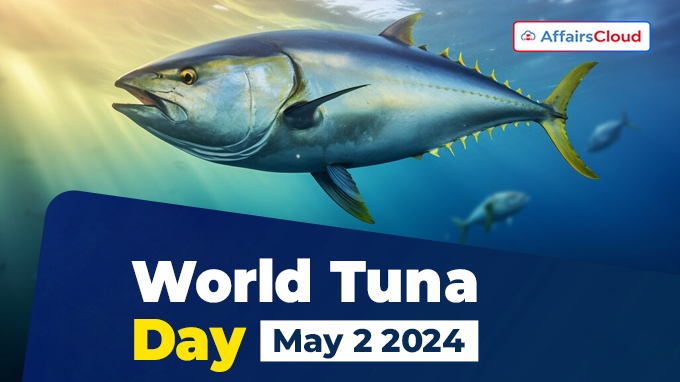 The United Nations (UN)’s World Tuna Day is annually observed across the globe on 2nd May to spread awareness of the importance of tuna, one of the most economically important fish species. It play a vital roles in food composition and nutrition of humans.
The United Nations (UN)’s World Tuna Day is annually observed across the globe on 2nd May to spread awareness of the importance of tuna, one of the most economically important fish species. It play a vital roles in food composition and nutrition of humans.
- The day underscores the importance of sustainable fishing practices to preserve the balance of marine ecosystems;
Background:
i.On 7th December 2016, the UN General Assembly (UNGA) adopted the resolution A/RES/71/124 and proclaimed the 2 May of every year as World Tuna Day.
ii.The 1st ever World Tuna Day was observed on 2nd May 2017.
About Tuna:
Family: Scombridae; Tribe: Thunnini (the group considered true tunas)
i.The tribe Thunnini contains 15 species in 5 genera: Thunnus, Euthynnus, Allothunnus, Auxis, and Katsuwonus.
ii.Tunas are extraordinary marine animals and are one of the most commercially valuable fish.
iii.Tuna is highly migratory and is widely distributed throughout all oceans in the world between equatorial and subpolar latitudes of both hemispheres.
iv.Tuna are a top predator and food source in the marine food chain and help to maintain a balance in the ocean environment.
v.Tuna is rich in Omega-3, minerals, proteins, and vitamin B12.
Key Points:
i.Over 7 million metric tons of tuna and tuna-like species are harvested yearly.
ii.Tuna species contribute 20% to the value of marine capture fisheries and over 8% to globally traded seafood.
iii.Over 96 countries are involved in the conservation and management of tuna, which has an annual value of almost 10 billion USD.
The Threat to Tuna Stocks:
i.The overwhelming demand threatens tuna populations; In 2017, among the 7 principal tuna species, 33.3% of the stocks were fished at biologically unsustainable levels.
ii.According to the International Seafood Sustainability Foundation, 61% of tuna stocks are at a healthy level of abundance, but 13% are considered overfished.
Common Oceans Tuna Project (2022-2027):
i.The “Sustainable Management of Tuna Fisheries and Biodiversity Conservation in the Areas Beyond National Jurisdiction” project, also known as the “ABNJ Tuna Project,” continues its mission from 2014 to 2019.
ii.This initiative focuses on enhancing responsible, efficient, and sustainable tuna production alongside biodiversity conservation in ABNJ amid environmental shifts.
iii.Funded by the Global Environment Facility (GEF), the project is led by the Food and Agriculture Organization of the United Nations (FAO)and executed by the Indian Ocean Tuna Commission (IOTC) via a dedicated Project Management Unit.
iv.This project aims to ensure that all major tuna stocks are fished at sustainable levels by 2027.
Note: From 2014-2019, the Common Oceans Tuna project helped reduce the number of tuna stocks experiencing overfishing from 13 to 5.
About Food and Agriculture Organization of the United Nations(FAO):
Director-General– QU Dongyu
Headquarters– Rome, Italy
Established in– 1945




